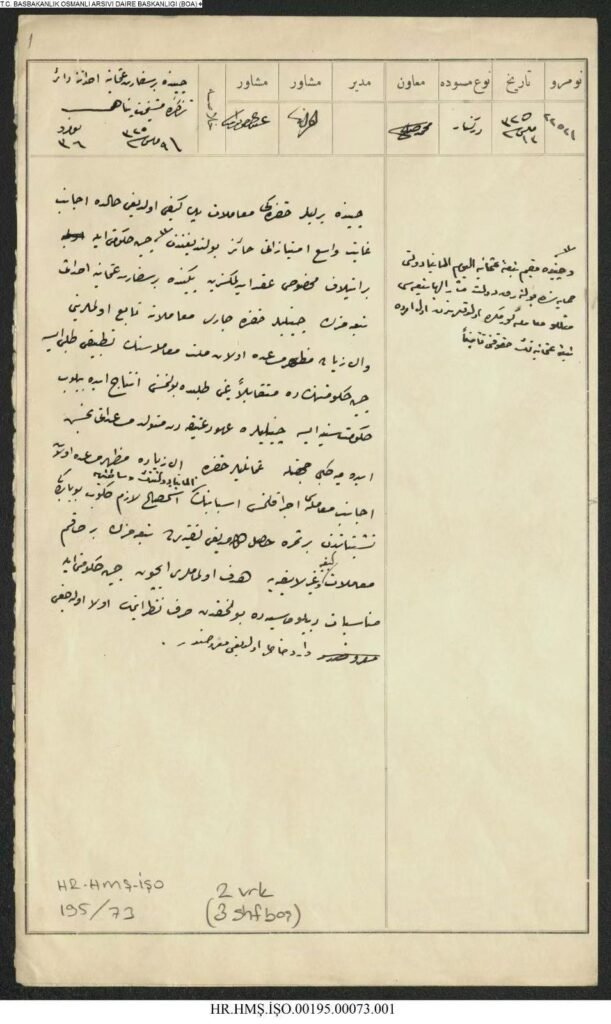Author: Emrah Zorba
Although there were occasional diplomatic contacts between the Ottoman Empire and China, formal relations were never established. Despite attempts to initiate official ties, no diplomatic treaties existed between the Ottoman state and China. At that time, bilateral relations were mostly conducted through third parties. While there were no official links, commercial relations did exist. It is known that before 1908, opium was exported annually from Ottoman lands to China.
The first contact of the Republic of Turkiye with the Chinese took place in 1927. However, the Turkish Embassy in Nanjing, which was the capital at that time, could only be opened in 1929. Hulusi Fuat Tugay began his mission in Nanjing in 1929 as the first chargé d’affaires. In 1931, due to economic difficulties, the Turkish Embassy in China was closed, and Tugay departed from China on August 2, 1931. In 1934, a Treaty of Friendship was signed between the two countries. The embassy, which had been closed in 1931 because of economic reasons, was reopened in 1939 with the appointment of Emin Ali Sipahi as ambassador. In 1944, both states raised their diplomatic missions to the level of embassies. Hulusi Fuat Tugay, who had first established Turkish-Chinese relations as chargé d’affaires during Atatürk’s era, was appointed as the first Turkish Ambassador (Adıbelli, 2016: 144–148). Between 1920 and 1950, under the leadership of Mustafa Kemal and İsmet İnönü, Turkey-China relations remained minimal economically and secondary politically from both sides’ perspectives (Güneş, 2012: 863). Especially due to China’s internal turmoil, relations in this period lacked continuity.
Diplomatic relations between the Republic of Turkiye and the People’s Republic of China were officially established in 1971. Although official ties began after the PRC’s recognition by the United Nations and the international community in 1971, the ideological atmosphere of the Cold War prevented bilateral relations from making progress until the 1980s. However, with the signing of trade protocols between the two countries in 1981, cooperation agreements in the fields of economy, industry, and technology, as well as President Kenan Evren’s first foreign visit to China in 1982, bilateral contacts began to intensify.
Originally preserved in the Ottoman Prime Ministry Archives, the following document dated 9 Jumada al-Awwal 1325 (May 26, 1907) from the Legal Consultation Office of the Ministry of Foreign Affairs represents the earliest known record of attempts to establish official relations with China.
The document shows an initiative to open an Ottoman embassy in China in order to protect Ottoman citizens residing there from mistreatment and arbitrary practices by German citizens and other foreigners, and to ensure their safety.
Latinized Version:
Since treatment of the locals in China was quite arbitrary, while foreigners enjoyed extensive privileges, (and as Ottoman subjects residing in China were currently under German protection and thus treated like German subjects, though at times exposed to improper treatment), it was deemed necessary, first of all, to secure the rights of the Ottoman subjects. Without concluding a specific agreement with the Chinese government, establishing an Ottoman embassy in Beijing would ensure that our subjects would not be subjected to arbitrary treatment by the Chinese and would receive the same treatment as the most favored nation. However, since the Sublime Porte could not grant to the Chinese any concessions deriving from old treaties, the protection to be afforded to Ottomans would be based on the most favored nation principle. Given that the German government’s efforts in this matter had produced no results, it was thought that, in order to prevent our subjects from facing arbitrary and improper practices, it might be preferable to abstain from entering into diplomatic relations with the Chinese government.
Simplified Version:
Because the treatment of locals in China was quite arbitrary and foreigners were granted extensive privileges (including Ottoman citizens living in China, who had been under German protection but nevertheless faced mistreatment, especially toward women), the primary aim was to ensure the safety of Ottoman citizens. Without signing a mutual special agreement with the Chinese government, establishing an Ottoman Embassy in Beijing would help protect our citizens among the Chinese and secure reciprocal application of the most favored nation treatment. Since the Ottoman government could not provide additional privileges to the Chinese beyond existing treaties, and because German efforts in this matter had failed, it was considered that, should no outcome be achieved, abstaining from diplomatic engagement with China would be the preferable option to prevent our citizens from being subjected to arbitrary and improper practices.
Retrieved from the September 2025 issue of Theory magazine





